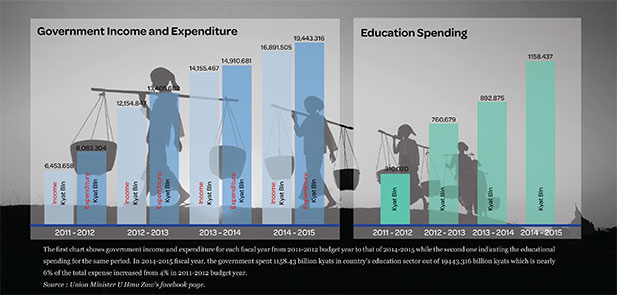Amendments to education law to be discussed
The Amyotha Hluttaw (Upper House of Parliament) has announced to hold discussions on the amendment to the National Education Law with stakeholders and the bill committee. Twenty rep- resentatives each from the Leading Committee for Democracy Education Movement, twenty from the National Network for Education and Reform (NNER) and political parties will involve in discussions with the bill committee on March 5th, 6th and 7th respectively. Then it will be followed by meetings with twenty interested political parties on March 8th, twenty supporters of student protestors on 11th and twenty enthusiasts from political parties and civil society organizations on 13th and 14th respectively. On 15th March, the discussions will be made upon the bill between twenty representatives who have advised on the amendment of the education bill and the bill committee. Scores of students have been protesting for a month heading to Yangon from central Myan- mar, Mandalay. Students stated to march into Yangon if the amendment on the education law is not passed by the end of February. After having done discussions between the government, the parliament, students and NNER for three times, the government has agreed to make amendments on the National Education Law. The students are demanding 11 points including decentralizing of curriculum control, formation of student and teacher unions and to increase spending on the country’s education sector.
Myanmar to electrify half the country by next year
According to the Union Minister for Electric Power, U Khin Maung Soe, half of more than nine million households in Myanmar will get access to electricity by the end of 2015-2016 fiscal year as a part of the process of electrifying the whole country by 2030. The latest data show that currently over 3.2 million households have been electrified, an increase from that of 2.1 million in 2010. Though the new government has increased the per capita consumption of electricity from 104 kWh to 190 kWh, only 33 percent of country’s total households have access to electricity. The govern- ment is expecting electricity usage of 4,500 MW by the year 2020, from the current electrification of 2,340 MW. The World Bank has suggested implementing 1.7 million grid connections in the first five years of 2015 to 2019 and more than 517,000 connections have to be made each year after 2019 in order to electrify the whole nation by 2030. Myanmar still has the lowest electrification rate in Southeast Asia.
Peace Talks Planned for March
The Union Peace-Making Work Committee (UPWC) has made an agreement with ethic armed groups to hold nationwide ceasefire talks in March. The UPWC had a meeting with the Nationwide Ceasefire Coordination Team (NCCT) in Chiang Mai on 5th February attended by Union Minister U Aung Min and UPWC members U Khin Maung Soe, U Khin Ye. Formal talks will continue after 12th March. The first peace talk between the government and the ethnic armed groups was held in 2013 November followed by a number of meetings in 2014. Last month, heavy fighting broke out around Laukkai in Kokang self-administered territory in northern Shan State. Myanmar’s armed forces were challenged by Myanmar National Democratic Alliance Army (MNDAA), a break-away Kokang armed group led by Pheung Kya Shin (Peng Jia Sheng).







